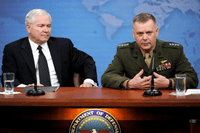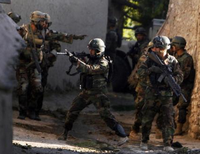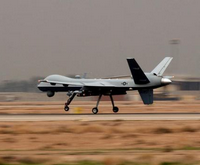Six years and nearly four months ago, Washington’s neocon advocates of the war to oust Saddam Hussein predicted that a grateful Iraqi population would welcome victorious U.S. forces with flowers, music and dancing in the streets. It never happened. There was none of the emotional dizziness and tears of happiness that accompanied the liberation of Paris in 1944 — the romantic prototype for such events, and doubtless what the neo-cons had in mind. But those displays are taking place this week. There is music and dancing in the streets as Iraq launches a national celebration to mark its real liberation: […]
Iraq Archive
Free Newsletter
When it comes to the stakes involved in today’s Iraq “withdrawal,” so far discussion has focused on the implications for the U.S. project in Iraq. But the outcome, as reflected in the security situation over the next six months, will have regional repercussions as well, because we’re currently applying variations of the same nation-building model we’ve used in Iraq around the Middle East and South Asia. The most obvious example is Afghanistan, and there’s overlap with what we’re pressuring Pakistan to do in the FATA. But there’s also the U.S. involvement in training Palestinian security forces in the West Bank. […]
If you thought Tom Ricks was pessimistic about Iraq in the post-U.S. era, you haven’t read Jari Lindholm: . . .Whatever Iraq will look like after the war is over, it will not be ademocracy. In fact, I wouldn’t be surprised if next January’sparliamentary election would be the last of its kind for at least acouple of decades. As for the actual “withdrawal” of U.S. troops from cities, officially effective today, Lindholm calls it largely symbolic: This may be a big deal politically to both Obama and Maliki, but on theground little will change for the Americans. They have already […]

Back before the Iraq surge, “military operations other than war” — a now-antiquated term referring to non-traditional warfare — were treated as “lesser includeds,” filed deep under subsections of big-war plans, doctrine, and acquisition strategies. Today, by contrast, the U.S. national security establishment is increasingly embracing what I like to call the “greater inclusive” paradigm, which recognizes our military’s rising quotient of such operations, not as some rare exception, but rather as the new rule. Thanks to Iraq and now Afghanistan-Pakistan, the military no longer assumes that any force constructed and trained for big wars can automatically handle the “other […]
In President Barack Obama’s restrained reaction to the upheaval in Iran, pragmatism won out. The administration’s calculation was that, in the long run, the United States was still going to have to do business with Iranian President Mahmoud Ahmadinejad. But Obama also avoided adding to what is widely perceived as America’s history of encouraging revolutions and then not supporting them. To mention two: References to the 1956 uprising in Hungary resurfaced this week because many Hungarians are still bitter that the West — and particularly the United States — failed to come to their aid in fighting Soviet troops. Radio […]
Joshua Foust highlights the disconnect between the public COINspeak surrounding Gen. Stanley McChrystal’s appointment to run the Afghanistan war and the private KILLspeak surrounding his appointment to run the Afghanistan war: [W]hile publicly McChrystal says everything rightabout being population-centric and all that, very few, and I mean thisseriously, VERY few of the groundpounders within USFOR-A are gettingexcited about finally executing a proper counterinsurgency. Instead,all the excitement is about “finally” being able to “take the fight tothe enemy,” “now we get to kick some ass,” and similar sentiments. In other words, at least a large number of soldiers, both within andwithout […]

Winning American wars these days is four parts politics and just one part fighting. Contemporary military doctrine — counterinsurgency and stability operations — tasks soldiers, on the whole, with state-building. Victory, or at least success, means building from the bottom up, rather than destroying from the top down. But because conditions on the ground are so delicate, for the one part of warfare that remains fighting, there’s no room for error. With Gen. Stanley McChrystal taking charge of U.S. and NATO troops in Afghanistan on Monday, warfighting is on everyone’s minds. McChrystal has been appointed to command the Afghanistan war […]
I’m sure I won’t be the one to convince him of why, but I disagree with Michael Cohen when he says that the “fetishization and enshrinement” of COIN is “a slippery slope for more not less US military intervention.” In the same post, Cohen rightfully reminds us that trends in military doctrine have a pretty short half-life. The U.S. didn’t go around looking for places where we could unleash an air war in the late-90s, after all, even though that trend, as Cohen insightfully points out, was all the rage after the Kosovo campaign. Surely that’s an argument against his […]

The skyrocketing use of unmanned aerial vehicles (UAVs) by U.S. forces in Iraq and Afghanistan has generated intense debate about how useful they are against insurgent/terrorist networks. Some prominent counterinsurgency experts have decried the “siege mentality” among non-combatant locals caused by collateral damage from the drone strikes. But despite the charge that drones represent a technology (i.e., a means) in search of a strategy (i.e., end goals), there’s no question that: 1) drones are here to stay, and 2) they’re truly re-symmetricizing the battlefield in a much-needed manner. Over the past generation, warfare has dramatically downshifted, from the Cold War’s […]
More signals are emerging of remarkable movement on the Turkey-Kurdish question. Turkey and Iraq just signed an MoU on military cooperation, which alone says a lot, given the fact that Turkey is still routinely violating Iraqi airspace and sovereignty in its campaign against the PKK. Meanwhile, Ankara’s engagement with Irbil, capital of the Kurdish Regional Government of Iraq, continues, with a planned visit by Foreign Minister Ahmet Davutoglu. Tangentially, the leader of Turkey’s main opposition party has been invited to both Baghdad (by Iraqi President Jalal Talabani) and to Washington (by President Barack Obama), in advance of the U.S. withdrawal […]
For some reason, this sentence from the CNAS report (.pdf) on Afghanistan and Pakistan that I wrote up yesterday kept rattling around the cranium: But because populations in civil wars tend to side with whichever group exercises control, protecting the population must take precedence over all other considerations. That sums up in a nutshell the central premise of COIN doctrine, from which all of its operational priorities are derived. Now, to be very clear, unlike Michael Cohen, I think that the COIN doctrine represents an enormous advance in the U.S. approach to warfare, both strategically and politically. Strategically, it represents […]
Seemingly lost in the news cycle is the fact that the Kurds just started unilaterally pumping “their” oil through a pipeline headed north to Turkey. The oil comes from a field jointly developed by a Canadian and Turkish consortium. This is one of those outcomes that would have seemed incredulous even last year. But there has been an increasingly visible sea change in Turkey’s relationship to Iraqi Kurdistan. Hannes Artens discussed it in his WPR briefing a few weeks back. But it now seems that Ankara has warmer relations with Iraq’s Kurds than with its own. What exactly that means […]
